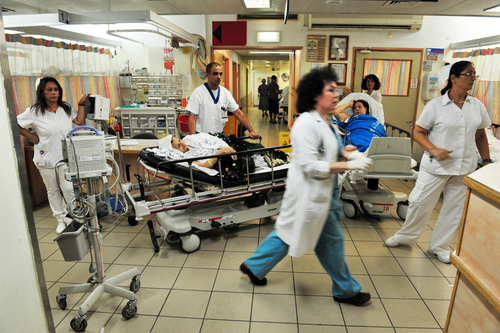Three healthcare institutions have created programs to improve civility using a variety of tools. Each addresses a different source of unruly behavior; patient-on-staff, staff-on-patient, and staff-on-staff.
Does it feel like the pandemic has given some people a license to be rude? For example, the stories about unruly airline passengers. The FAA has fined a passenger $32,750 for refusing to wear a face mask, throwing food and an empty alcohol bottle, and grabbing and striking two flight attendants. There have been more than 1,300 cases since February 1 of unruly passengers according to the FAA.
Although the hard work and sacrifices faced by healthcare workers during the pandemic are well publicized, they are not immune to this trend. “In the early days of the COVID-19 pandemic, fewer people were visiting ERs, which led to a drop in violent incidents. But that has changed as emergency rooms and hospitals began filling up again. National Nurses United surveyed 15,000 registered nurses across the U.S. and found that 20% reported increased workplace violence, in November 2020.” (1)
Despite these increases, roughly 70% of healthcare providers have no program to address incivility and violence.
Three institutions have created programs that address the problem using a variety of tools. And each addresses a different source of uncivil behavior; patient-on-staff, staff-on-patient, and staff-on-staff.
Cleveland Clinic
Adrienne Boissy, Chief Experience Officer and Staff Neurologist shared efforts at the Cleveland Clinic to address unruly behavior. Shortly after visitation restrictions went into effect in April 2020 they saw threatening behavior increase and complaint rates doubled. Cleveland Clinic has taken several measures.
- A workplace violence committee created an on-line system for reporting of violence, created Speak Up awards, and used visible signage indicating violence will not be tolerated.
- Behavioral Contracts are used with difficult patients to outline expected behavior & language and the resulting consequences.
- Communicate with H.E.A.R.T. and REDE to Communicate are civility training programs required for all caregivers. Since training in groups is difficult during a pandemic, pocket cards for clinicians and placemats for patients and visitors reenforced face masks and social distancing.
- A piece Boissy co-authored with Christine Porath of Georgetown University for the Harvard Business Review encourages healthcare workers to Find Your Tribe. “Emotions are contagious: Our brains are wired to mirror the body language and emotion of others. Although that contagion makes incivility dangerous (bringing us to the brink of “uncivil war”), it also offers a way forward. Because happiness, peace, and empathy are also infectious, we can actually change ourselves, our teams, and the world — one gesture at a time.”
UMass Memorial
In 2019 UMass Memorial Health Care embarked on a civility campaign which trained 96% of employees on 6 Standards of Respect (SoR). According to Eric Dickson, CEO of UMass Memorial, “the Standards of Respect program is the linchpin that has led to a big increase in patient satisfaction, an increase in engagement, improved execution on projects, and in a way that people feel respect. There’s also been a palpable increase in performance.” The Standards of Respect challenge employees to;
- Acknowledge patients when they have questions
- Listen to what our patients are saying when they are describing pain or discussing the issues they face
- Communicate clearly in language they can understand
- Respond to patient needs and addressing what they need in their timeframe and not ours
- Work together with our colleagues to be team players to support our patients
- Be kind to our patients – asking them how they are doing, smiling, showing compassion
Johns Hopkins
Taking an unusual approach, Johns Hopkins created a Civility Initiative and put in charge Piero Massimo Forni, an Italian Literature scholar and professor. The Initiative assembles an annual retreat of Johns Hopkins Medical Staff to consider approaches to deescalate situations between staff members. According to Forni, “Good manners … are also something we do for our own sake. They are good for us because they help us manage our relationships, which are crucial to our health.” The retreats focus on civility among coworkers. Examples of doctors berating nurses is “the tip of the iceberg”. Attendees break into groups to discuss a variety of scenarios with a goal to develop immediate and systemic solutions. “Incivility is a highly contagious and communicable disease,” said Renee Blanding, Vice President of medical affairs at Johns Hopkins Bayview Medical Center. “Recognition that you have the disease is the first step.”
Mental Health America conducted a recent survey and found 93% of health care workers were experiencing stress, 86% reported experiencing anxiety, 77% reported frustration, 76% reported exhaustion and burnout, and 75% said they were overwhelmed. As a community we should be doing more to treat each other with empathy and respect, not only for the sake of healthcare workers but to help improve patient outcomes. As a part of that community, AiRISTA supports efforts to protect our frontline workers and issued a press release encouraging support in the U.S. Senate for the Workplace Violence Protection for Healthcare and Social Services Act passed by the House.
- “Workplace Violence Rises, Particularly for Nurses, Frontline Workers”, Security, March 19, 2021





